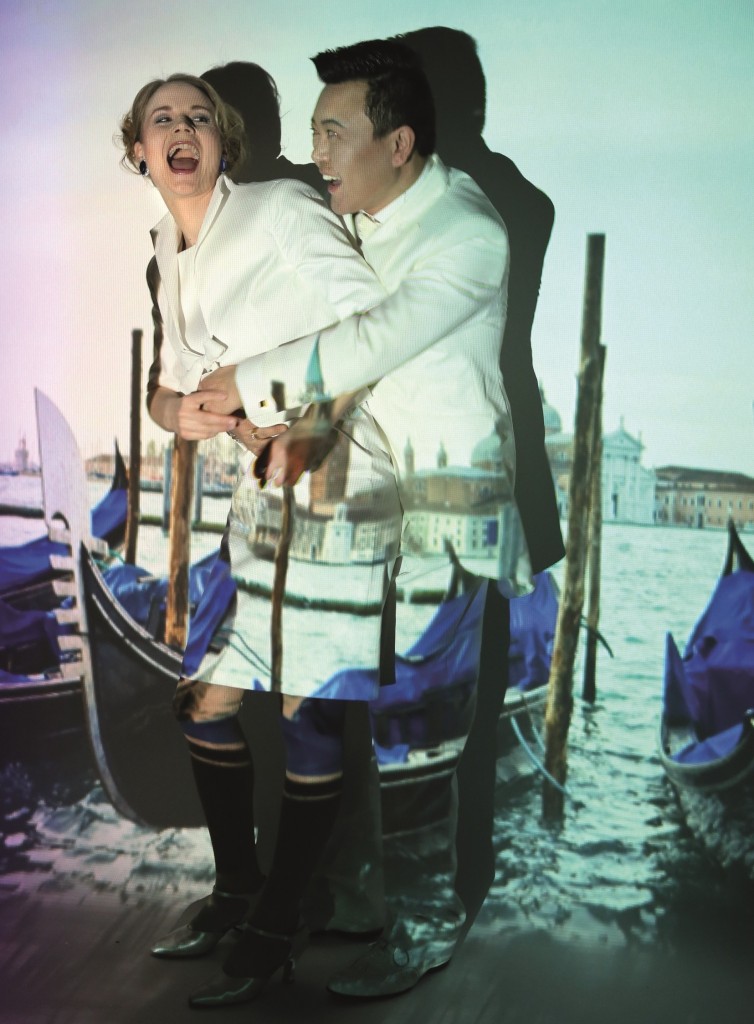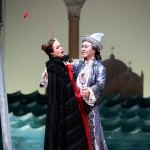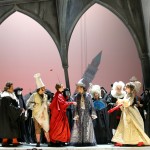 Johann Strauss’s music, was never more popular, with the New Years Day waltzes beamed worldwide. But are the Operettas rather outdated? Not this gleaming new Vienna Volksoper production of A Night in Venice (Eine Nacht in Venedig) . Strauss’s score is gloriously tuneful, its arias evergreen; and, libretto by Die Fledermaus’s F. Zell and Richard Genee, it still works as great theatre. (A packed house responded to the witty dialogue with spontaneous laughter.) And there’s nothing second rate about this cast, nor the very smooth sound of Vienna’s Volksoper orchestra.
Johann Strauss’s music, was never more popular, with the New Years Day waltzes beamed worldwide. But are the Operettas rather outdated? Not this gleaming new Vienna Volksoper production of A Night in Venice (Eine Nacht in Venedig) . Strauss’s score is gloriously tuneful, its arias evergreen; and, libretto by Die Fledermaus’s F. Zell and Richard Genee, it still works as great theatre. (A packed house responded to the witty dialogue with spontaneous laughter.) And there’s nothing second rate about this cast, nor the very smooth sound of Vienna’s Volksoper orchestra.
The preposterous plot of lovers’ intrigues- further complicated in a Venice carnival- centers on the visit of the Duke of Urbino, a notorious womaniser- aided by his personal barber (Figaro?) Caramello, seeking Barbara, the frisky wife of elderly senator Delacqua. To thwart jealous Delaqua, Annina -actually Caramello’s lover- takes her mistress Barbara’s place. And the servants- Ciboletta, the Senator’s cook, in love with Pappacoda- manipulate their masters. But whereas in Die Fledermaus the champagne is to blame, in A Night in Venice, it’s the carnival. Alle maskiert, Alle maskiert, wo Spass, wo Tollheit und lust regiert.‘ The masks and disguises of carnival are opportunity and excuse for fun, wildness and desire.
It opens with a pageant around Pappacoda’s traditional (Venetian) macaroni stall- quaint outfits with pointed hats. Behind, backstage, there are cut-out floating waves on wires, and- in Hinrich Horstkotte’s clever design – there’s an ingenious network of canals across the stage. Annina (soprano Mara Mastalir), posing as her mistress Barbara, appears in a pink gown singing magically of frutti die mare (she’s a fisherman’s daughter.) Barbara, on a jaunt, Manuela Leonhartsberger, appears only briefly. Ciboletta the cook (Johanna Arrouas), nattering away, is a fine-voiced soprano (Volksoper ensemble). Caramello, the Duke’s assistant, tenor Jorg Schneider, is a big boy. The operetta’s comic lead sings the famous Komm in die Gondel (end Act 1) and the Laguna Waltz (Act 3). Caramello’s ‘quite a fellow’- bouffon hair, eccentric moustache, culottes, and orange boots- sings he’ll do anything to get Annina back in his arms. Her song of loyalty doesn’t ring true. The quartet of disguised pairs, Ciboletta/Papacoda and Annina/Caramello, introduce the Alle maskiert number: (fun, folly, and …sex!)
 The Duke of Urbino introduces himself. ‘My greetings to the fine city of Venice. Nature made you a place for love.’ Vincent Schirrmacher’s entrance lifts the production to a higher level. His is a very impressive tenor, authorative, in the traditional (Viennese) operetta style. He’s got star quality. Schirrmacher’s dressed in a purple glitter outfit, Venetian headpiece, white cravatte. Good looking, perhaps oriental -it doesn’t matter, he’s got charisma, and such a voice. He’s never seen Barbara unmasked, so he’s taken in by the disguised Annina. ‘The moon has filed a suit before the Court’, he wafts. The costumes are ingeniously designed so we can see behind the masks.
The Duke of Urbino introduces himself. ‘My greetings to the fine city of Venice. Nature made you a place for love.’ Vincent Schirrmacher’s entrance lifts the production to a higher level. His is a very impressive tenor, authorative, in the traditional (Viennese) operetta style. He’s got star quality. Schirrmacher’s dressed in a purple glitter outfit, Venetian headpiece, white cravatte. Good looking, perhaps oriental -it doesn’t matter, he’s got charisma, and such a voice. He’s never seen Barbara unmasked, so he’s taken in by the disguised Annina. ‘The moon has filed a suit before the Court’, he wafts. The costumes are ingeniously designed so we can see behind the masks.
The Chorus, Volksoper’s, crucial in the scheme, have some of the plum numbers. ‘For who knows what tomorrow will bring…’ extends into ‘Man is pre-occupied with three things: Love , wine and coffee.’ Si nette tutto in sacce. Bring it on.
The interior of the Duke’s palace looks surprisingly opulent -Volksoper is Vienna ‘s second opera house, after all. The Duke, Schirrmacher, is dressed in very glamorous gold orienatal robes. Annina, Mara Mastalir, the other star of the show, sings she will do what it takes to lure her man. Mastalir’s soprano is beguiling, with outstanding technique. The Duke, pursuing her- the disguised Annina – around the stage, is tantalised. But why so cruel, Barbara? She sings, don’t get so close : I spoke (only) of a rendez-vous…The music loosens all restraints, Schirrmacher croons.
The second Act staging -given Volksoper’s relatively modest resources – is remarkable. A screen descends. There is a sensational framing of the cast as if on a boat. It’s like a floating box, around them and behind, Venice waterways, projected onto the opening white screen. Very effective.
Who doesn’t know of the doves of Saint Marco, sing the Chorus. They set an example for any couple. In the ensemble, some cast are waving tall rods which appear like doves fluttering. Hilariously camp.
The highlight again is Schirrmacher’s aria, ‘Ah , how lovely to gaze at the lovely ladies…As rash as the ebbing tide, their flights of fancy; no one knows what they’re thinking.’ Lovely ladies, Schirmacher’s gorgeous tenor rises.
In Act 3 the ridiculous senator Delacqua is looking for his wife Barbara everywhere. There’s a lot of dialogue in operetta, interspersed between the musical numbers. And thus ‘operetta’, transported to America, was a forerunner to the musical, especially from the 1930s the Hollywood musical. But this dialogue is German -although there are English subtitles- and it’s very witty. Agricola, asks Delacqua is that a man? ‘No but she wears the trousers,’ explains Ciboletta, his cook . ‘Now I’m confused!’ The old senator (Hubsch) wanders in a daze, repeating ‘I’m looking for a woman, I’m looking for Barbara.’ He’s told, your wife will turn up on Ash Wednesday, when the disguises are discarded. So the show closes with the repeated refrain, ‘It’s carnival all around. Whatever bores us will be ridiculed.’  It’s an extravagant looking set, and the carnival costumes are respendently colourful, intricate, top drawer.
It’s an extravagant looking set, and the carnival costumes are respendently colourful, intricate, top drawer.
This new Vienna Volksoper revival of Strauss’s A Night in Venice must be recommended. The production is traditional, but so is carnival. The cast were polished, the leads Schirrmacher and Mastalir outstanding. Volksoper chorus were exemplary, and the Volksoper orchestra refined, but under Lorenz C. Aichner, not quite their best (as under Volksoper’s director Albert Eshwe.) P.R. 4.1.2014
Photos: Mara Mastalir (Annina) and Vincent Schirrmacher (Duke of Urbino) ;
Featured image Group shot ensemble
(c) Barbara Palffy / Volksoper Wien
viennaoperareview.com
Vienna's English opera blog
